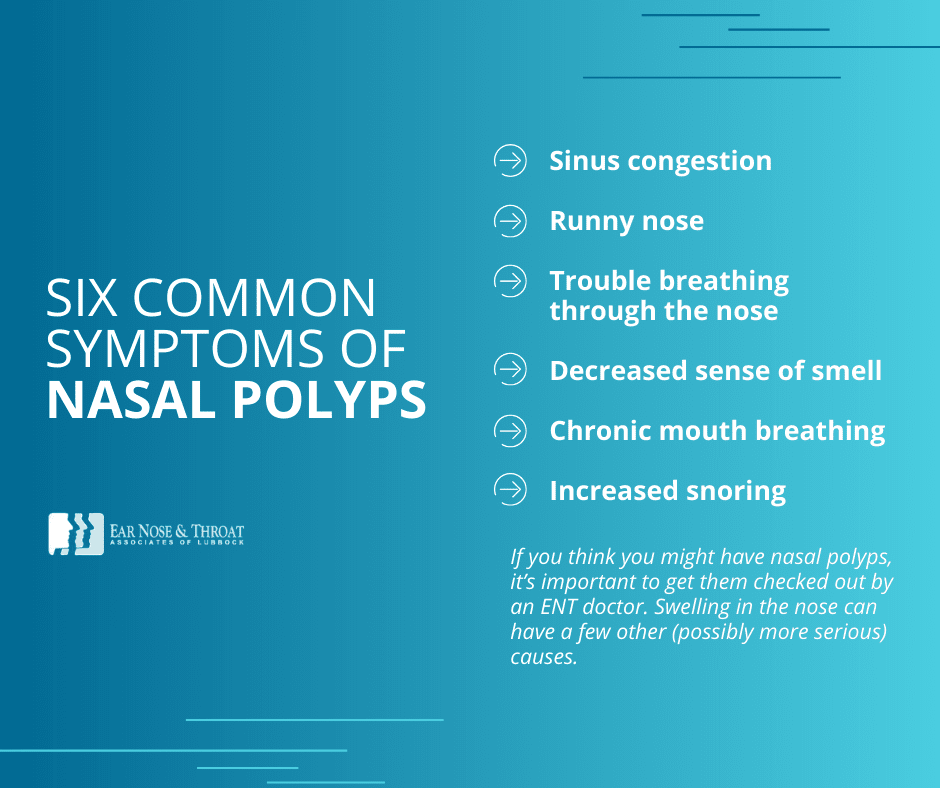Nasal Polyps: Causes, Symptoms & Treatment

If you’re an allergy sufferer, you probably know the feeling of waking up with nasal blockage on a regular basis. You’re no stranger to complaints about your snoring, and you dread the spring and summer because of all the hay fever!
Even those of us lucky enough not to be afflicted with seasonal allergies have developed our own nasal dilemma in the wake of the COVID-19 pandemic.
Is this runny nose just a cold? Is it an allergy to the high pollen count? Or is it triggered by all these lovely West Texas dust storms?
Is your decreased sense of smell just because of your stuffy nose, or is it a sign of COVID?
Nasal problems can be confusing because so many of them have similar symptoms. Nasal polyps are no different.
What Exactly Are Nasal Polyps, and Where Do They Come From?
Essentially, nasal polyps are just swollen tissue in the nose that blocks airflow. And they don’t always have one, specific cause.
About one third of the cases of nasal polyps we see in the office are in patients with allergies or asthma.
In other cases, the nasal tissue swells because the patient is sensitive to a nonsteroidal anti-inflammatory drug (an “NSAID”) like ibuprofen, taken for pain or fever. A syndrome called Samter’s triad includes three main symptoms: asthma, nasal polyps, and sensitivity to aspirin.
Less commonly, people who have autoimmune issues or difficulty regulating their immune systems can develop nasal polyps. Children with cystic fibrosis can as well. Churg-Strauss syndrome can also lead to the formation of nasal polyps, but this is an extremely rare disorder.

What Kinds of Symptoms Do Nasal Polyps Cause?
Several common symptoms may indicate nasal polyps:
- sinus congestion
- runny nose
- trouble breathing through the nose
- decreased sense of smell
- chronic mouth breathing
- increased snoring
What Else Could This Be?
An ear, nose, and throat (ENT) doctor can diagnose nasal polyps by using a small lighted camera to look in your nostrils. Because nasal polyps are easy to diagnose, the risk of misdiagnosis is pretty low.
If you think you might have nasal polyps, it’s important to get them checked out by an ENT doctor. Swelling in the nose can have a few other (possibly more serious) causes.
Rarely, nasal swelling can indicate a benign (noncancerous) or malignant (cancerous) tumor in the nostril.
Even more uncommon, nasal encephaloceles occur when a portion of the brain tissue or brain lining descend down into the nostrils. Fortunately, nasal encephaloceles are extremely rare!
These rare but serious conditions show why it’s always good to see your doctor.
The good news is that nasal polyps are usually not dangerous at all. Generally, they’re just a result of too much inflammation in the nose.
What Are My Treatment Options for Nasal Polyps?
Nasal Spray Medications
Your ENT doctor may prescribe a topical steroid or a nasal antihistamine.
These medications come in a bottle, and you spray them up into your nose. They can control the inflammation caused by allergies and asthma and help the polyps decrease in size.
Allergy Injections
When polyps are a little more severe, receiving allergy shots is also an option for treatment. There are also new injectable biologic medications that have shown great promise in controlling extreme cases of nasal polyposis, often called polypoid sinus degeneration.
Endoscopic Sinus Surgery
When your nasal polyps block up your sinuses and make it impossible to breathe through your nose, endoscopic sinus surgery is usually the way to go.
Endoscopic sinus surgery is generally a quick and routine outpatient procedure.
While you’re under general anesthesia, the surgeon inserts a small scope with a tiny camera into your nose and back into your sinus cavities (the open spaces behind your nose and cheekbones.) Your surgeon then uses very tiny surgical tools to remove the polyps and restore airflow.
Because this surgery is performed through the nostrils, there are no surgical scars. You can expect to be resting at home in your bed just a few hours later!
Often your doctor will prescribe a nasal spray treatment after the surgery to control the regrowth of nasal polyps.
Can I Do Something To Keep from Getting Nasal Polyps?
The best way to prevent nasal polyps is to be proactive about your allergy care.
Especially if you deal with asthma and seasonal allergies, be sure to check in regularly with your ENT doctor. Don’t skip out on doses of allergy shots to save time. These treatments can help keep inflammation at bay and sometimes prevent polyps from forming in the first place.
If you suspect you may be sensitive to nonsteroidal drugs and aspirin, avoid these. (Be sure to chat with your doctor about other ways to treat pain and fever.)
Unfortunately, there’s no magic bullet to prevent nasal polyps from forming or recurring. Some of us are simply more susceptible to polyps than others.
Do You Think You Might Have Nasal Polyps?
Have you noticed your nose becoming progressively more congested? Are you having a harder time identifying smells even though your COVID test was negative? Or do you have uncontrolled allergies or asthma?
Nasal polyps are fairly benign and harmless, but it’s always a good idea to rule out something more serious. Nasal polyps are also fairly easy to treat, so there’s nothing to lose!
If you blow your nose a few times and still feel like something is blocking your nasal passages, give us a call. An ENT Associates of Lubbock physician can examine your nose and see if nasal polyps are the culprit. We can also help you identify the nasal polyp treatment combination that’s right for you.
If you have uncontrolled allergies or asthma, we can help you treat those, too. Prompt treatment of allergies and asthma is key in preventing future polyps. Contact our office today to schedule a consultation.
Dr. Scolaro is a board-certified Otolaryngologist servicing the South Plains area. He has been practicing in Lubbock since 1990 and has earned a reputation as a skilled and experienced surgeon. He currently serves as the Medical Director for Covenant High Plains Surgery Center campuses, is a member of Covenant Health Partners and is an adjunct faculty professor for Texas Tech University Health Sciences Center School of Medicine. Learn more about Dr. Scolaro.
Categories:








